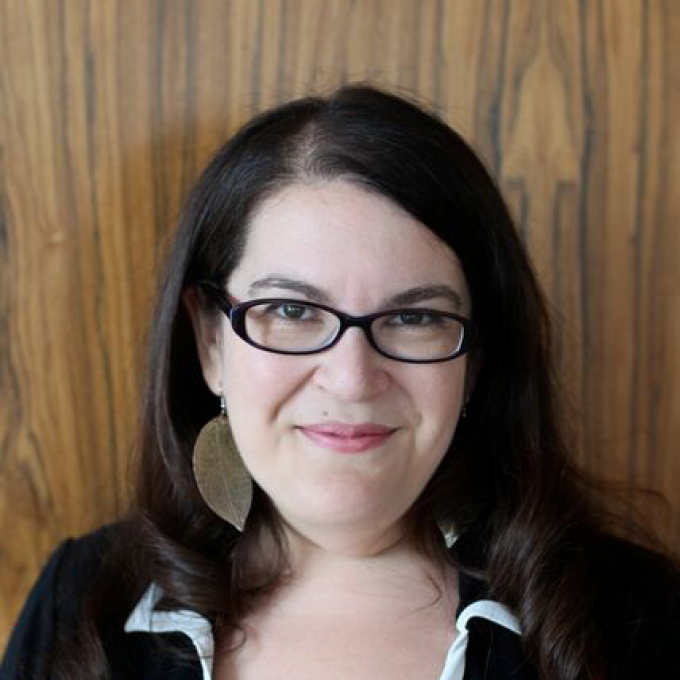
- ©
- Justine Stoddard
Naomi Alderman
- London, England
Biography
Naomi Alderman was born in London in 1974 and grew up in an Orthodox Jewish community.
After attaining a BA in Philosophy, Politics and Economics from Lincoln College, Oxford, Alderman spent several years working in New York. She later returned to the UK and attained an MA in Creative Writing from the University of East Anglia.
Alderman's first novel, Disobedience (2006), inspired by her own upbringing, features a 30-something female protagonist whose father's death is the catalyst for her return to the Orthodox Jewish community in which she grew up. It was awarded the Orange Award for New Writers in 2006, and the following year Alderman won the Sunday Times Young Writer of the Year Award.
Alderman's second novel, The Lessons (2010), which explores the lives of a group of Oxford students, has been compared to Evelyn Waugh's Brideshead Revisited. It was followed by The Liars' Gospel (2012), a mature and ambitious work that offers different perspectives on the life of Jesus through four different narrators. All three novels have been adapted for the BBC Radio Four series Book at Bedtime.
Alderman's short stories have been published in Prospect magazine and various anthologies, as well as being adapted for BBC Radio Four. In 2009, 'Other People's Gods' was shortlisted for the BBC National Short Story Award.
Alderman is also a successful video games writer and creator. She has written online games for Penguin and the BBC, and was the lead writer (2004-2007) on the alternative reality game, Perplex City, which was nominated for a BAFTA. In 2012 she was one of the co-creators of a hugely popular iPhone fitness game, Zombies, Run!. Alderman has also written Borrowed Time (2011), a tie-in novel for the long-running television series, Doctor Who.
In 2012 and 2013, Naomi was mentored by Margaret Atwood as part of the Rolex Mentor and Protégé Arts Initiative. She is Professor of Creative Writing and Digital Media at Bath Spa University, and in April 2013 she was named one of Granta's Best of Young British Novelists in their once-a-decade list.
In October 2016, Alderman published her fourth novel, The Power, a science fiction novel about a world in which women develop the power to conduct electricity. It won the Baileys Prize in 2017.
Critical perspective
Naomi Alderman's award-winning novel, Disobedience (2006), is regarded as the first novel to explore Orthodox Jewish life in England since George Eliot's Daniel Deronda (1876).
Disobedience therefore immediately attracted attention, though it was also controversial - partly because of its critique of London's Orthodox Jewish community and partly because it includes a bold and candid portrayal of lesbianism and bisexuality.
The novel was inspired by Alderman's own experiences of Orthodox Judaism and there are similarities between the protagonist and the author, but it is not autobiographical. Nonetheless it is firmly rooted in Hendon, north London, where the author grew up, offering a detailed portrait not just of the Jewish community but also the physical locality, even down to real street names and shops:
"I marched through Golders Green, passing by the rows of Jewish stores. The little world my people have built here. The kosher butchers' shops frowned at me, asking why I hadn't tried their chopped liver … Moishe's salon raised an eyebrow at my hairstyle and wondered if I wouldn't like something, maybe, a bit more like everyone else?"
(Disobedience, p.121)
Disobedience's protagonist is 32-year-old Ronit, whose first-person narrative sections regularly interrupt the third-person prose, offering the reader different perspectives. Ronit is the strong-willed, independent daughter of a highly revered rabbi, Rav Krushka, "from whom the light of Torah seemed to shine so brightly that [his congregation] felt themselves illuminated by his presence" (Disobedience, p.2). Feeling stifled and oppressed by the inflexible patriarchal traditions of her Jewish community, Ronit has escaped to New York, where she is free to live her own life. However, her father's death at the start of the novel brings Ronit back to Hendon for the first time in several years, where she is simultaneously comforted by Jewish mourning rituals ("It's very orderly, very precise", Disobedience, p.32) and repelled by the monotonous conventionality that drove her away:
"It's being back here with all those little couples sitting in their identical houses producing identical children … They just fit together, the whole set - like Orthodox Jew Barbie: comes complete with Orthodox Jew Ken, two small children, the house, the car and a selection of kosher foodstuffs." (Disobedience, p.115)
Ronit's return also brings her face-to-face with Esti, a childhood friend with whom she had a sexual relationship. Esti's life provides an interesting contrast to that of the protagonist: while Ronit has rejected Jewish life, Esti has conformed to traditional conventions - cultural, religious and sexual - by marrying a rabbi. By focusing on female characters and, more specifically, lesbianism and bisexuality, Alderman explores with a critical eye the strict hierarchical traditions of Orthodox Judaism, in which women are marginalised and gay women have no place at all. As one critic comments: "Through the complex relationship between these two characters [Ronit and Esti], Alderman examines the rigid expectations for women within the Orthodox community and gives voice to lives that often remain hidden from the mainstream" (Alderman entry, Contemporary Authors, Gale, 2007).
Alderman's second novel is rich, evocative and dark: The Lessons (2010) depicts the intense and claustrophobic lives of a group of Oxford undergraduates who cluster around Mark Winters, a rich and glamorous gay man whose hedonistic and promiscuous behaviour hides a deeply troubled and damaged personality. At first glance, The Lessons appears vastly different from Disobedience. However, under the surface there are notable similarities: just as Alderman's first novel offers a critical portrait of the closed world of Orthodox Judaism, The Lessons invites the reader to enter the cloistered, traditional world of Oxford University, one of England's oldest and most prestigious institutions. As Alderman herself comments:
"I was a bit p****d off that so many novels about Oxford talk about the beauty and the glamour and the glittering prizes, but not about the vast amount of work and how everyone seems to be having breakdowns all the time." (www.naomialderman.com/the-lessons/, accessed 8/2/13).
Alderman goes on to say that, along with the exploration of Oxford life - which, like Disobedience, is inspired by her own first-hand experience - The Lessons is also about money and the damaging effects of a wealthy upbringing: "…partly it's about money. What having a huge amount of money does to a person. How it can distort friendships and relationships" (www.naomialderman.com/the-lessons/, accessed 8/2/13).
Various critics have noted the similarities between The Lessons and Evelyn Waugh's 1945 novel, Brideshead Revisited. Damian Barr comments: "Fantastically rich, flamboyantly Catholic and painfully handsome, Winters could easily - like so many freshers - be a studied pastiche of Sebastian." Nonetheless, despite the obvious similarities between the two novels, there are also notable differences - Alderman's compelling and ultimately tragic novel is very much her own demystification of Oxford life, as well as a fascinating psychological study of the manipulative influence of a charismatic but disturbed man:
"Alderman's book goes far beyond the Brideshead she carefully evokes … Whereas Brideshead is basically the story of Charles and Sebastian, The Lessons deals with the complex web of relationships spun between all the people under Mark's influence. As a child lines up insects for battle, so Mark toys with the emotions and affections of his erstwhile tenants and friends." (Damian Barr, Independent on Sunday, 11 April 2010.)
In her third novel, Alderman once again draws on her Jewish roots, but this time she has written an ambitious historical work: The Liars' Gospel (2012) is an original take on the story of Jesus, told through the stories of four people who knew him, each speaking a year after his death. Alderman, richly schooled in Jewish learning, reverts to traditional Hebrew names: Jesus is Yehoshuah, and his story is told in turn by his mother Miryam (Mary); Iehuda of Qeriot (Judas Iscariot), a former friend; Caiaphas, High Priest of the great Temple of Jerusalem, and Bar-Avo (Barabbas), a rebel and murderer.
Alderman has commented that writing The Liars' Gospel was about "making sense of this story in a Jewish way" (interview with Margaret Howie, October 2012, http://www.bookslut.com/features/2012_10_019446.php, accessed 4 February 2013).
Tom Holland agrees that the novel seeks to reclaim Jesus as a Jew:
"Over the millennia, the Jewishness of Jesus has been an embarrassment to Jews as well as to Christians … Now, with her ambitious new novel, Naomi Alderman has given us an entire Jewish gospel, the story of a preacher who may be madman, miracle-worker or both." (Guardian review, 6 September 2012.)
Alderman sought the assistance of historians to help her understand the society and politics of Jesus' time, and The Liars' Gospel is an authentic, detailed account of Judea under Roman occupation - a society pervaded by violence and religious extremism. Yet the novel also resonates with modern-day society, reminding us how little has changed and how many religious and political conflicts are still taking place - this is particularly poignant coming from an author who witnessed first-hand the collapse of New York's Twin Towers on September 11 2001, and later wrote The Liars' Gospel just a few miles away from where the 2011 London riots were taking place.
Nonetheless, despite her unsentimental approach and her willingness to question religious truths, Alderman does not completely deny the possibility of Jesus' divinity, and she certainly acknowledges the importance of what he taught (note that the word 'Liars' in the title is in the plural and therefore does not refer to Jesus himself, but to those who wrote about him). The novel's epilogue comments:
"So much of what he said, he took from the Torah of the Jews … But Yehoshuah was unique, in his time and place, for saying, 'Love your enemy.'
It is a dreamer's doctrine. Visionary, astonishing … If all involved had listened to those words, matters would have fallen out quite differently. And if those who claimed to follow him later had dedicated themselves to that one thing - 'Love your enemy' - much bloodshed might have been avoided." (p.260)
Ultimately, The Liars' Gospel depicts a deep and authentic spirituality, beyond religious doctrine and dogma, as Alderman herself comments: "It's a blow against the kind of blinkered fundamentalism I grew up with, as well as a genuinely spiritual journey in text" (interview with Margaret Howie, reference above).
Elizabeth O'Reilly, 2013
Bibliography
Awards
Author statement
"Why do I write? The sane answer is: because things make me angry. I think that's mostly where I start, because something has annoyed me and I think to myself 'someone should write about this!' and then I realise that, oh right, that should be me. Well, that's one reason, it's a reason that makes sense. The other reason is something more numinous like: because the words seem to lead me in a particular direction. Other people who've written might understand this, I think. Words lead one on step by step to somewhere new and beautiful and ridiculous. I write for both of those reasons, a sensible one and a crazy one."


